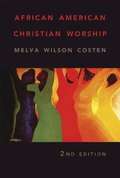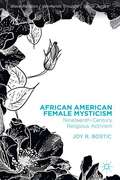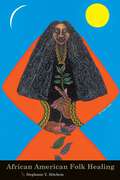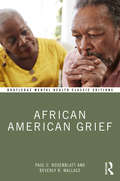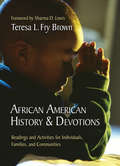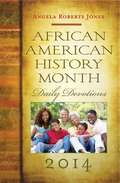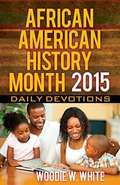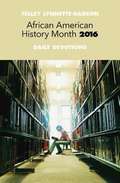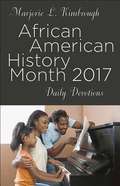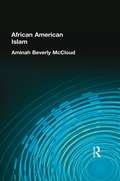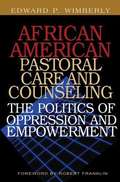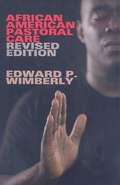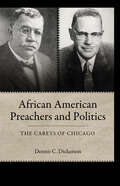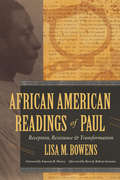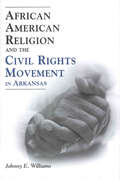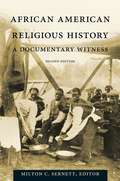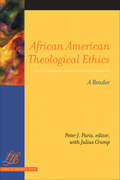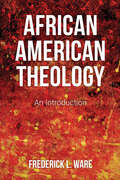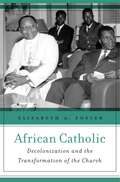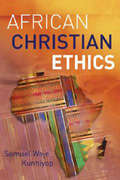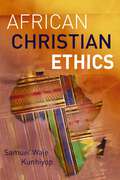- Table View
- List View
African American Christian Worship: 2nd Edition
by Melva W. CostenIn this update to her 1993 classic, African American Christian Worship, Melva Wilson Costen, again delights her reader with a lively history and theology of the African American worship experience. Drawing upon careful scholarship and engaging stories, Dr. Costen details the global impact on African American worship by media, technology, and new musical styles. She expands her discussion of ritual practices in African communities and clarifies some of the ritual use of music in worship. In keeping with recent congregational practices, Dr. Costen will also provide general orders of worship suitable for a variety of denominational settings.
African American Female Mysticism
by Joy R. BosticAfrican-American Female Mysticism: Nineteenth Century Religious Activism is an important book-length treatment of African-American female mysticism. The primary subjects of this book are three icons of black female spirituality and religious activism - Jarena Lee, Sojourner Truth, and Rebecca Cox Jackson.
African American Folk Healing
by Stephanie MitchemCure a nosebleed by holding a silver quarter on the back of the neck. Treat an earache with sweet oil drops. Wear plant roots to keep from catching colds. Within many African American families, these kinds of practices continue today, woven into the fabric of black culture, often communicated through women. Such folk practices shape the concepts about healing that are diffused throughout African American communities and are expressed in myriad ways, from faith healing to making a mojo. Stephanie Y. Mitchem presents a fascinating study of African American healing. She sheds light on a variety of folk practices and traces their development from the time of slavery through the Great Migrations. She explores how they have continued into the present and their relationship with alternative medicines. Through conversations with black Americans, she demonstrates how herbs, charms, and rituals continue folk healing performances. Mitchem shows that these practices are not simply about healing; they are linked to expressions of faith, delineating aspects of a holistic epistemology and pointing to disjunctures between African American views of wellness and illness and those of the culture of institutional medicine.
African American Grief (Routledge Mental Health Classic Editions)
by Paul C. Rosenblatt Beverly R. WallaceAfrican American Grief is a unique contribution to the field, both as a professional resource for counselors, therapists, social workers, clergy, and nurses, and as a reference volume for thanatologists, academics, and researchers. The classic edition includes a new preface from the authors reflecting on their work and on the changes in society and the field since the book’s initial publication. This work considers the potential effects of slavery, racism, and white ignorance and oppression on the African American experience and conception of death and grief in America. Based on interviews with 26 African Americans who have faced the death of a significant person in their lives, the authors document, describe, and analyze key phenomena of the unique African American experience of grief. The book combines moving narratives from the interviewees with sound research, analysis, and theoretical discussion of important issues in thanatology, as well as topics such as the influence of the African American church, gospel music, family grief, medical racism as a cause of death, and discrimination during life and after death.
African American History & Devotions: Readings and Activities for Individuals, Families, and Communities
by Teresa L. BrownForeword by Sharma D. LewisTwenty-eight devotions for individuals, families, or small groups, including a scripture verse, a reflection on the scripture, related activities for each day, and a prayer. This intergenerational devotional is great for use during Black History Month, but can be used at any time.
African American History Month Daily Devotions 2014
by Angela Roberts JonesCelebrate African American History Month with this annual collection of devotions. As you read through the month of February, you'll be inspired and encouraged by meditations based on a Scripture passage and on African American history as well as a theme-based prayer. These devotions increase a sense of knowledge and awareness of African American history, foster pride in that history and accomplishment, and strengthen personal and communal faith, hope, and commitment to a rich heritage and future. The African American History Month devotion is perfect for church Bible study, opening meditations for meetings and events, and personal use.
African American History Month Daily Devotions 2015
by Woodie W. WhiteCelebrate African American History Month with this annual collection of devotions. Each daily reading throughout the month of February provides a Scripture passage, an inspiring and encouraging meditation, and a prayer. These devotions increase a sense of knowledge and awareness of African American history, foster pride in that history, and strengthen personal and communal faith, hope, and commitment to a rich heritage and future. The African American History Month Daily Devotions is perfect for church Bible study, opening meditations for meetings and events, and personal use.
African American History Month Daily Devotions 2016
by Telley Lynnette GadsonTelley Lynnette Gadson introduces readers to some of the women and men from her journey. She does this to represent the culture, heritage, and history of the legacy of black prolific expression from the pulpit to the pew, from the altar to the alley, and from the pastor's study to the parking lot. Her message is whatever you do, whatever you go through, whatever you experience, don't forget who you are. This February, make African American History Month into something even more than a time to increase knowledge and foster pride of African American history. Use it as an occasion to strengthen personal and communal faith, hope, and commitment to a rich heritage and future with this daily devotional specifically created for use during African American History Month. Each day you'll be inspired and encouraged whether you use the devotions for personal reflection or in group studies. The devotions are also perfect to use in opening meditations for meeting and events.
African American History Month Daily Devotions 2017
by Marjorie L. KimbroughStrengthens personal and communal faith, hope, and commitment to a rich heritage and future. Scripture-based readings of hope, inspiration, and encouragement for each day of February—African American History Month. Each devotion contains an inspirational mediation based on a scripture passage and on African American history, and a prayer based on the theme. Church congregations will find African American History Month perfect for Bible study, for opening meditations for meetings and events, as well as for personal daily devotions for the entire month. These devotions increase a sense of knowledge and awareness of African American history, foster pride in that history and accomplishment, and strengthen personal and communal faith, hope, and commitment to a rich heritage and future.
African American Holidays: A Historical Research and Resource Guide to Cultural Celebrations
by James C. AnyikeAnyike provides the reader with a comprehensive blueprint on how to celebrate 'holy days'. This excellent book will inspire African Americans to take the days seriously while enjoying the celebrations.
African American Islam
by Aminah Beverly McCloudIslam is a vital, growing religion in America. Little is known, however, about the religion except through the biased lens of media reports which brand African American Muslims as "Black Muslims" and portray their communities as places of social protest. African American Islam challenges these myths by contextualizing the experience and history of African American Islamic life. This is the first book to investigate the diverse African American Islamic community on its own terms, in its own language and through its own synthesis of Islamic history and philosophy.
African American Pastoral Care and Counseling: The Politics of Oppression and Empowerment
by Edward P. WimberlyAll of these iterations of modern faith seem errant and in need of correction. African American Pastoral Care and Counseling may be just what we needed at this hour in history.
African American Pastoral Care: Revised Edition
by Edward P. WimberlyRespond to God's unfolding drama to bring healing and reconciliation. In this major revision of his classic book, Dr. Edward Wimberly updates his narrative methodology by examining current issues in African American pastoral care and counseling.
African American Preachers and Politics: The Careys of Chicago (Margaret Walker Alexander Series in African American Studies)
by Dennis C. DickersonDuring most of the twentieth century, Archibald J. Carey, Sr. (1868–1931) and Archibald J. Carey, Jr. (1908–1981), father and son, exemplified a blend of ministry and politics that many African American religious leaders pursued. Their sacred and secular concerns merged in efforts to improve the spiritual and material well-being of their congregations. But as political alliances became necessary, both wrestled with moral consequences and varied outcomes. Both were ministers to Chicago's largest African Methodist Episcopal Church congregations—the senior Carey as a bishop, and the junior Carey as a pastor and an attorney. Bishop Carey associated himself mainly with Chicago mayor William Hale Thompson, a Republican, whom he presented to black voters as an ally. When the mayor appointed Carey to the city's civil service commission, Carey helped in the hiring and promotion of local blacks. But alleged impropriety for selling jobs marred the bishop's tenure. The junior Carey, also a Republican and an alderman, became head of the panel on anti-discrimination in employment for the Eisenhower administration. He aided innumerable black federal employees. Although an influential benefactor of CORE and SCLC, Carey associated with notorious FBI director J. Edgar Hoover and compromised support for Martin Luther King, Jr. Both Careys believed politics offered clergy the best opportunities to empower the black population. Their imperfect alliances and mixed results, however, proved the complexity of combining the realms of spirituality and politics.
African American Readings of Paul: Reception, Resistance, and Transformation
by Lisa M. BowensThe letters of Paul—especially the verse in Ephesians directing slaves to obey their masters—played an enormous role in promoting slavery and justifying it as a Christian practice. Yet despite this reality African Americans throughout history still utilized Paul extensively in their own work to protest and resist oppression, responding to his theology and teachings in numerous—often starkly divergent and liberative—ways. In the first book of its kind, Lisa Bowens takes a historical, theological, and biblical approach to explore interpretations of Paul within African American communities over the past few centuries. She surveys a wealth of primary sources from the early 1700s to the mid-twentieth century, including sermons, conversion stories, slave petitions, and autobiographies of ex-slaves, many of which introduce readers to previously unknown names in the history of New Testament interpretation. Along with their hermeneutical value, these texts also provide fresh documentation of Black religious life through wide swaths of American history. African American Readings of Paul promises to change the landscape of Pauline studies and fill an important gap in the rising field of reception history.
African American Readings of Paul: Reception, Resistance, and Transformation
by Lisa M. BowensThe letters of Paul—especially the verse in Ephesians directing slaves to obey their masters—played an enormous role in promoting slavery and justifying it as a Christian practice. Yet despite this reality African Americans throughout history still utilized Paul extensively in their own work to protest and resist oppression, responding to his theology and teachings in numerous—often starkly divergent and liberative—ways. In the first book of its kind, Lisa Bowens takes a historical, theological, and biblical approach to explore interpretations of Paul within African American communities over the past few centuries. She surveys a wealth of primary sources from the early 1700s to the mid-twentieth century, including sermons, conversion stories, slave petitions, and autobiographies of ex-slaves, many of which introduce readers to previously unknown names in the history of New Testament interpretation. Along with their hermeneutical value, these texts also provide fresh documentation of Black religious life through wide swaths of American history. African American Readings of Paul promises to change the landscape of Pauline studies and fill an important gap in the rising field of reception history.
African American Religion and the Civil Rights Movement in Arkansas (Margaret Walker Alexander Series in African American Studies)
by Johnny E. WilliamsWhat role did religion play in sparking the call for civil rights? Was the African American church a motivating force or a calming eddy? The conventional view among scholars of the period is that religion as a source for social activism was marginal, conservative, or pacifying. Not so, argues Johnny E. Williams. Focusing on the state of Arkansas as typical in the role of ecclesiastical activism, his book argues that black religion from the period of slavery through the era of segregation provided theological resources that motivated and sustained preachers and parishioners battling racial oppression. Drawing on interviews, speeches, case studies, literature, sociological surveys, and other sources, Williams persuasively defines the most ardent of civil rights activists in the state as products of church culture. Both religious beliefs and the African American church itself were essential in motivating blacks to act individually and collectively to confront their oppressors in Arkansas and throughout the South. Williams explains how the ideology of the black church roused disparate individuals into a community and how the church established a base for many diverse participants in the civil rights movement. He shows how church life and ecumenical education helped to sustain the protest of people with few resources and little permanent power. Williams argues that the church helped galvanize political action by bringing people together and creating social bonds even when societal conditions made action difficult and often dangerous. The church supplied its members with meanings, beliefs, relationships, and practices that served as resources to create a religious protest message of hope.
African American Religions, 1500–2000
by Sylvester A. JohnsonThis book provides a narrative historical, postcolonial account of African American religions. It examines the intersection of Black religion and colonialism over several centuries to explain the relationship between empire and democratic freedom. Rather than treating freedom and its others (colonialism, slavery and racism) as opposites, Sylvester A. Johnson interprets multiple periods of Black religious history to discern how Atlantic empires (particularly that of the United States) simultaneously enabled the emergence of particular forms of religious experience and freedom movements as well as disturbing patterns of violent domination. Johnson explains theories of matter and spirit that shaped early indigenous religious movements in Africa, Black political religion responding to the American racial state, the creation of Liberia, and FBI repression of Black religious movements in the twentieth century. By combining historical methods with theoretical analysis, Johnson explains the seeming contradictions that have shaped Black religions in the modern era.
African American Religious History: A Documentary Witness
by Milton C. SernettThis widely-heralded collection of remarkable documents offers a view of African American religious history from Africa and early America through Reconstruction to the rise of black nationalism, civil rights, and black theology of today. The documents--many of them rare, out-of-print, or difficult to find--include personal narratives, sermons, letters, protest pamphlets, early denominational histories, journalistic accounts, and theological statements. In this volume Olaudah Equiano describes Ibo religion. Lemuel Haynes gives a black Puritan's farewell. Nat Turner confesses. Jarena Lee becomes a female preacher among the African Methodists. Frederick Douglass discusses Christianity and slavery. Isaac Lane preaches among the freedmen. Nannie Helen Burroughs reports on the work of Baptist women. African Methodist bishops deliberate on the Great Migration. Bishop C. H. Mason tells of the Pentecostal experience. Mahalia Jackson recalls the glory of singing at the 1963 March on Washington. Martin Luther King, Jr. writes from the Birmingham jail. Originally published in 1985, this expanded second edition includes new sources on women, African missions, and the Great Migration. Milton C. Sernett provides a general introduction as well as historical context and comment for each document.
African American Religious Studies: An Interdisciplinary Anthology
by Gayraud WilmoreThis anthology provides a coherent, interdisciplinary theoretical base for students of African American religious studies and will assist in the design of programs and courses for lay theological education and training. To this end, the editor has assembled material from Old and New Testament studies, theology, church history, pastoral counseling, worship, and social action.
African American Theological Ethics: A Reader
by Editor Peter J. Paris Julius CrumpThis volume in the Library of Theological Ethics series draws on writings from the early nineteenth through the late twentieth centuries to explore the intersection of black experience and Christian faith throughout the history of the United States. The first sections follow the many dimensions of the African American struggle with racism in this country: struggles against theories of white supremacy, against chattel slavery, and against racial segregation and discrimination. The latter sections turn to the black Christian vision of human flourishing, drawing on perspectives from the arts, religion, philosophy, ethics, and theology. It introduces students to major voices from African American Christianity, including Frederick Douglass, Richard Allen, W. E. B. DuBois, Marcus Garvey, Martin Luther King Jr., Bayard Rustin, Barbara Jordan, James H. Cone, and Jacqueline Grant. This is the essential resource for anyone who wishes to understand the role that Christian faith has played in the African American struggle for a more just society.
African American Theology: An Introduction
by Frederick L. WareThis book presents a substantial introduction to the major methodologies, figures, and themes within African American theology. Frederick L. Ware explores African American theology from its inception and places it within dual contexts: first, the African American struggle for dignity and full humanity; and second, the broader scope of Christian belief. Readers will appreciate Ware's demonstration of how black theology is expressed in a wide range of sources that includes not only scholarly publications but also African American sermons, music, news and editorials, biography, literature, popular periodicals, folklore, and philosophy. Each chapter concludes with questions for discussion and suggested resources for further study. Ware provides a seasoned perspective on where African American theology has been and where it is going, and he demonstrates its creativity within the chorus of Christian theology.
African Catholic: Decolonization and the Transformation of the Church
by Elizabeth A. FosterElizabeth Foster examines how French imperialists and the Africans they ruled imagined the religious future of sub-Saharan Africa in the years just before and after decolonization. The story encompasses the transition to independence, Catholic contributions to black intellectual currents, and efforts to create an authentically “African” church.
African Christian Ethics
by Samuel Waje KunhiyopThis is an introduction to African Christian Ethics for Christian colleges and Bible schools. The book is divided into two parts. The first part deals with the theory of ethics, while the second discusses practical issues. The issues are grouped into the following six sections: Socio-Political Issues, Financial Issues, Marriage Issues, Sexual Issues, Medical Issues, and Religious Issues. Each section begins with a brief general introduction, followed by the chapters dealing with specific issues in that area. Each chapter begins with an introduction, discusses traditional African thinking on the issue, presents an analysis of relevant biblical material, and concludes with some recommendations. There are questions at the end of each chapter for discussion or personal reflection, often asking students to reflect on how the discussion in the chapter applies to their ministry situation.
African Christian Ethics (Hippo Ser.)
by Samuel Waje KunhiyopThis is an introduction to African Christian ethics for Christian colleges and Bible schools. The book is divided into two parts. The first part deals with the theory of ethics, while the second discusses practical issues. The issues are grouped into the following six sections: Socio-Political Issues, Financial Issues, Marriage Issues, Sexual Issues, Medical Issues, and Religious Issues. Each section begins with a brief general introduction, followed by the chapters dealing with specific issues in that area. Each chapter begins with an introduction, discusses traditional African thinking on the issue, presents an analysis of relevant biblical material, and concludes with some recommendations. There are questions at the end of each chapter for discussion or personal reflection, often asking students to reflect on how the discussion in the chapter applies to their ministry situation.
